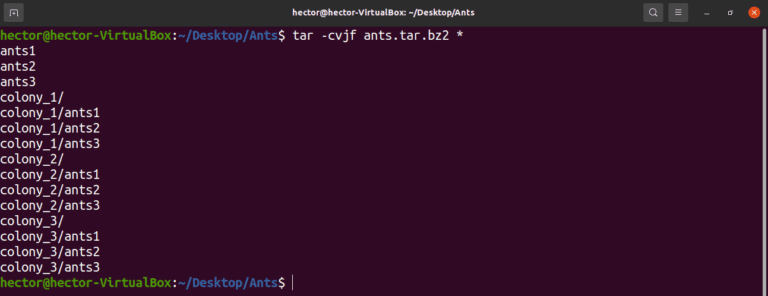

- Unix command to untar a file archive#
- Unix command to untar a file code#
- Unix command to untar a file zip#
tar.gz): tar xjf 2 - to uncompress a bzip2 tar file.
Unix command to untar a file archive#
It even works as a filter.ħz doesn't create archives with full filesystem information on UNIX, so you'd need to use tar before using 7z (but since 7z stores other information about the tar file, I'd recommend using xz, as it is designed for it): tar cf - file1 file2 dir | 7za z -si archive.tar. Unix tar and gzip commands tar and compress a bunch of datafiles and then untar and uncompress them tar cvf gzip -c >/u02/oradata/testbkup/. However, if the file was in a sub-directory named bar, youd want to specify your un-tar command like this: tar xzvf my-archive.tgz bar/foo Beware absolute paths One thing to be careful about here is to see if files are in the archive with an absolute path. tar xzf - to uncompress a gzip tar file (.tgz or. Xz is a UNIX tool, that uses LZMA2 for compression, but works the way gz, bz2, etc works. If you want to use the same compression algorithm with your tarballs, use the -J switch with tar: tar cJf file1 file2 dir I recommend this method in case Windows users can't open 7z archives (in case you want to advice a tool for that: PeaZip).

If your files are large, very repetitive, etc, you may need to use the -dictionary-size and -match-length options directly to achieve optimal performance. 4 Answers Sorted by: 78 If your jar file already has an absolute pathname as shown, it is particularly easy: cd /where/you/want/it jar xf /path/to/jarfile.jar That is, you have the shell executed by Python change directory for you and then run the extraction. The bidimensional parameter space of LZMA can't be mapped to a linear scale optimal for all files. It first helps the user to extract or, in other words, unpack files in the compressed mode, and once the unpacking or extraction is done. This command is used for 2 specific utilities in file operations.
Unix command to untar a file code#
Code : find /name1/name2/name2/ -name '. Untar is a command that enables users to extract compressed files with tar, tar.gz, and tar.bz2 compression formats. Unzip is a program to unpack, list, test, and compressed (extract) files and it may not be installed by default. It can also create self-extracting archives with the -sfx switch: 7za a -sfx archive.exe files1 file2 dir Dictionary sizes 12 to 29 are interpreted as powers of two, meaning 212 to 229 bytes. I used tar command to archive files from a list and then all files were removed from name1/name2/name2/. You can use the unzip or tar command to extract (unzip) the file on Linux or Unix-like operating system.
Unix command to untar a file zip#
Usually in the package p7zip, you'll get the 7z and 7za command, with which you can create your own 7z archives.ħza can also decompress standard ( pkzip) zip archives (and create them as well with the -tzip switch).Ĭompressing: 7za a archive.7z file1 file2 directory/ Well, when it comes to distributing files for a variety of operating systems, I'd recommend 7-zip.


 0 kommentar(er)
0 kommentar(er)
